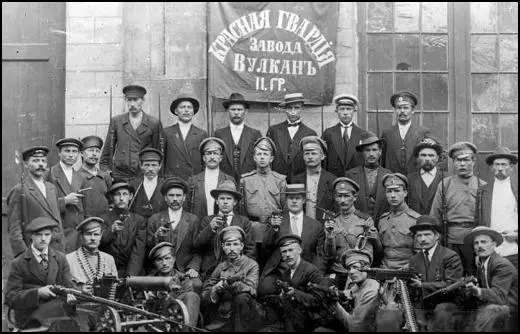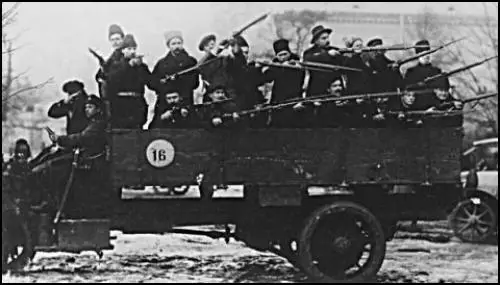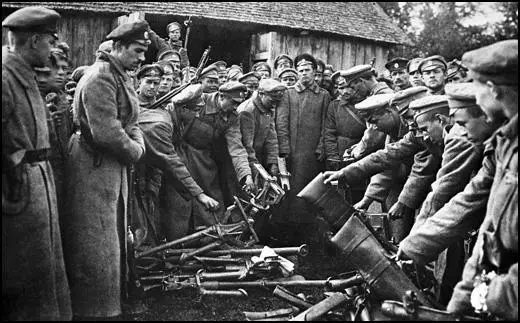Kornilov Revolt
In May, 1917, Alexander Kerensky became War Minister. He appointed General Alexei Brusilov as the Commander in Chief of the Russian Army. He toured the Eastern Front where he made a series of emotional speeches where he appealed to the troops to continue fighting. On 18th June, Kerensky announced a new war offensive. According to David Shub: "The main purpose of the drive was to force the Germans to return to the Russian front the divisions which they had diverted to France in preparation for an all-out offensive against the Western Allies. At the same time, the Provisional Government hoped this move would restore the fighting spirit of the Russian Army." (1)
Encouraged by the Bolsheviks, who favoured peace negotiations, there were demonstrations against Kerensky in Petrograd. The Bolshevik popular slogan "Peace, Bread and Land", helped to increase support for the revolutionaries. By the summer of 1917, the membership of the Bolshevik Party had grown to 240,000. The Bolsheviks were especially favoured by the soldiers who found Lenin's promise of peace with Germany extremely attractive. (2)
Prince George Lvov was in conflict with Victor Chernov over the changes taking place over land ownership. Chernov issued circulars that supported the actions of the local land committees in reducing the rents of land leased by the peasants, seizing untilled fields for peasant use and commanding prisoner-of-war labour from private landowners. Lvov accused Chernov of going the back of the government and he prevailed on the ministry of justice to challenge the legality of Chernov's circulars. Without the full support of the cabinet in this dispute, Lvov resigned as prime minister on 7th July. (3)

Kerensky became the new prime minister and soon after taking office, he announced another new offensive. Soldiers on the Eastern Front were dismayed at the news and regiments began to refuse to move to the front line. There was a rapid increase in the number of men deserting and by the autumn of 1917 an estimated 2 million men had unofficially left the army. Some of these soldiers returned to their homes and used their weapons to seize land from the nobility. Manor houses were burnt down and in some cases wealthy landowners were murdered. Kerensky and the Provisional Government issued warnings but were powerless to stop the redistribution of land in the countryside.
After the failure of the July Offensive on the Eastern Front, Kerensky replaced General Alexei Brusilov with General Lavr Kornilov, as Supreme Commander of the Russian Army. Kornilov had a fine military record and unlike most of the Russian senior officers, came from a poor breakdown. "This combination made Kornilov the man of destiny in the eyes of those conservative and moderate politicians... who hoped that through him the Revolution might be tamed. But not only the right pinned its hopes on Kornilov. Kerensky and some in in his entourage hoped to use the general to destroy any future Bolshevik threat and to remove or diminish the tutelage of the soviets over the Provisional Government." (4)
Morgan Philips Price, a British journalist, saw Kornilov make a speech on 24th August 1917: "A wiry little little man with strong Tartar features. He wore a general's full-dress uniform with a sword and red-striped trousers. His speech was begun in a blunt soldierly manner by a declaration that he had nothing to do with politics. He had come there, he said, to tell the truth about the condition of the Russian army. Discipline had simply ceased to exist. The army was becoming nothing more than a rabble. Soldiers stole the property, not only of the State, but also of private citizens, and scoured the country plundering and terrorizing. The Russian army was becoming a greater danger to the peaceful population of the western provinces than any invading German army could be." (5)

However, the two men soon clashed about military policy. Kornilov wanted Kerensky to restore the death-penalty for soldiers and to militarize the factories. He told his aide-de-camp, that "the time had come to hang the German agents and spies, headed by Lenin, to disperse the Soviet of Workers' and Soldiers' Deputies so that it can never reassemble." On 7th September, Kornilov demanded the resignation of the Cabinet and the surrender of all military and civil authority to the Commander in Chief. Kerensky responded by dismissing Kornilov from office and ordering him back to Petrograd. (6)
Kornilov now sent troops under the leadership of General Aleksandr Krymov to take control of Petrograd. Kornilov believed that he was going to become military dictator of Russia. This became known as the Kornilov Revolt. He had the open support of a number of prominent Russian industrialists, headed by Aleksei Putilov, owner of the steelworks and the leading Petrograd banker. Others involved in the plot included Alexander Guchkov, a backer of an organization called the Union for Economic Revival of Russia. According to one source these industrialists had raised 4 million rubles for Kornilov's conspiracy. (7)
Kerensky was now in danger and so he called on the Soviets and the Red Guards to protect Petrograd. The Bolsheviks, who controlled these organizations, agreed to this request, but in a speech made by their leader, Lenin, he made clear they would be fighting against Kornilov rather than for Kerensky. Within a few days Bolsheviks had enlisted 25,000 armed recruits to defend Petrograd. While they dug trenches and fortified the city, delegations of soldiers were sent out to talk to the advancing troops. Meetings were held and Kornilov's troops decided to refuse to attack Petrograd. General Krymov committed suicide and Kornilov was arrested and taken into custody. (8)

Harold Williams, a journalist working for the Daily Chronicle, pointed out: "The Kornilov Affair has intensified mutual distrust and completed the work of destruction. The Government is shadowy and unreal, and what personality it had has disappeared before the menace of the Democratic Assembly. Whatever power there is again concentrated in the hands of the Soviets, and, as always happens when the Soviets secure a monopoly of power, the influence of the Bolsheviks has increased enormously. Kerensky has returned from Headquarters, but his prestige has declined, and he is not actively supported either by the right or by the left." (9)
Another journalist, Arthur Ransome, confirmed this view. Roland Chambers, the author of The Last Englishman: The Double Life of Arthur Ransome (2009) has argued: "While Petrograd was fortified by the same troops that had mobbed the streets during the July Days, the railway union held up trains carrying Kornilov's supplies. When the advance slowed, Bolshevik envoys were sent out to explain to the soldiers under Kornilov's command that the Provisional Government was not, as they had supposed, in any danger. The whole business had simply been a misunderstanding cooked up by two ambitious tyrants: the first being General Kornilov, the second already notorious for betraying every promise he had made to the people. For the moment, it would be in the Soviet's best interests if they simply laid down their arms... With the collapse of the Kornilov offensive, the immediate threat from the Right had been removed. Kornilov's second-in command - the man who had actually led the mutiny - committed suicide. Kornilov himself and twenty-three of his generals were arrested and incarcerated." (10)
Primary Sources
(1) Brian York, The Soviet Union (1983)
At the time of the overthrow of the Tsar the people and the soldiers on the streets were not well organized. It was the leaders of the duma (the weak parliament which Nicholas II had allowed) who took the initiative. They were mainly liberal aristocrats like their first leader, Prince Lvov, or middle-class men like Kerensky who became minister of justice. They declared themselves to be the `provisional' (or temporary) government of Russia. They promised to rule until an assembly elected by the people could decide on a new democratic system of government. However, they were not anxious to fulfil this promise quickly and gave as an excuse that a time of war and chaos was not suitable for elections.
(2) P. D. Allan, Russia and Eastern Europe (1983)
The new Commander-in-Chief was the popular hero, General Lavr Kornilov. Kerensky wanted him to be ready to deal with any new trouble from the Bolsheviks, but Kornilov decided that the time had come to replace Kerensky with a new dictatorship under himself. Kornilov thought Kerensky too weak and too socialist to be worth protecting. In the last week of August he began to march on the capital. Kerensky's position was desperate and he was forced to call on the support of the left-wing groups, including the Bolsheviks, to save him. The imprisoned Bolshevik leaders were freed and arms handed over to them.
(3) In his book My Reminiscences of the Russian Revolution, the journalist, Morgan Philips Price described General Lavr Kornilov making a speech in Moscow on 25th August, 1917.
A wiry little little man with strong Tartar features. He wore a general's full-dress uniform with a sword and red-striped trousers. His speech was begun in a blunt soldierly manner by a declaration that he had nothing to do with politics. He had come there, he said, to tell the truth about the condition of the Russian army. Discipline had simply ceased to exist. The army was becoming nothing more than a rabble. Soldiers stole the property, not only of the State, but also of private citizens, and scoured the country plundering and terrorizing. The Russian army was becoming a greater danger to the peaceful population of the western provinces than any invading German army could be.
(4) Christopher Hill, Lenin and the Russian Revolution (1947)
In September there was an attempt at a coup d'etat by the commander-in-chief, General Kornilov, which was defeated, not by Kerensky and his government, but by the rank-and-file workers and soldiers in and around Petrograd, whom the Bolsheviks, through the Soviets, swung into action against Kornilov. The railway workers stopped his trains, the telegraph operators stopped his messages. The Cadet leader Milyukov, summed the situation up accurately when he said: `For a short time the choice was free between Kornilov and Lenin.... Driven by a sort of instinct the masses - for it was with the masses that the decision lay - pronounced for Lenin.' Everyone knew that the Bolsheviks had saved Petrograd from Kornilov: their prestige gained enormously. It was the first occasion on which the "soviet" parties had collaborated, and as a consequence strong opposition wings began to appear within the Menshevik and S.R. parties which wished to break with the Cadets and work with the Bolsheviks. The Petrograd and Moscow Soviets gained new vigour and energy,'and succeeded in evading Kerensky's order to disband the military detachments which they had formed against Kornilov.
(5) G. F. Hudson, Fifty Years of Communism (1947)
Kerensky, had appointed as Commander-in-Chief of the Army a general of peasant origin named Kornilov. Kornilov declared that he could not take responsibility for holding the front against the Germans unless measures were taken to restore discipline in the army and curb the powers of the soldiers' committees. At first Kerensky agreed to his proposals, but then became suspicious of his intentions and denounced him as a counterrevolutionary.
(6) Richard Appignanesi, Lenin for Beginners (1977)
Kerensky, now Prime Minister of the Provisional Government, toys with a 'Napoleonic' plot to seize Petrograd. At the last minute Kerensky gets cold feet and abandons the plot. Kornilov's military uprising was defeated in a few days by the workers and soldiers of the Petrograd Soviet - thanks to the assistance of the Bolshevik party... which was still being suppressed and persecuted by the government!
(7) Lionel Kochan, Russia in Revolution (1970)
General Krymov, who led the advance-guard against the Soviet, committed suicide. His fellow-conspiritors - Kornilov himself, Lukomsky, his aide-decamp, Kaledin, of the Don Cossacks - were all taken prisoner, but not harshly treated.... The men on horseback had failed. The Kornilov movement, such as it was, ended in fiasco, without bloodshed.
(8) David Footman, The Russian Revolutions (1962)
Kerensky and his Cabinet were still, officially, in power. But there had been a striking change in the mood throughout the country. The Bolsheviks could now claim to have been the leaders in the `victory over the counterrevolution', and their power and influence rapidly increased. Trotsky was let out of prison and took his place in the Petrograd Soviet. On 13th September the Soviet, for the first time, showed a majority for a resolution proposed by the Bolsheviks. A few days later the Moscow Soviet did the same. In Petrograd the Bolsheviks had now many thousands of well-armed Red Guards, and when the authorities asked for the rifles to be returned to the Government arsenals the Red Guards refused to give them up.
(9) Harold Williams, Daily Chronicle (29th September, 1917)
The Kornilov Affair has intensified mutual distrust and completed the work of destruction. The Government is shadowy and unreal, and what personality it had has disappeared before the menace of the Democratic Assembly. Whatever power there is again concentrated in the hands of the Soviets, and, as always happens when the Soviets secure a monopoly of power, the influence of the Bolsheviks has increased enormously. Kerensky has returned from Headquarters, but his prestige has declined, and he is not actively supported either by the right or by the left.
Student Activities
Russian Revolution Simmulation
Bloody Sunday (Answer Commentary)
1905 Russian Revolution (Answer Commentary)
Russia and the First World War (Answer Commentary)
The Life and Death of Rasputin (Answer Commentary)
The Abdication of Tsar Nicholas II (Answer Commentary)
The Provisional Government (Answer Commentary)
The Kornilov Revolt (Answer Commentary)
The Bolsheviks (Answer Commentary)
The Bolshevik Revolution (Answer Commentary)
Classroom Activities by Subject
